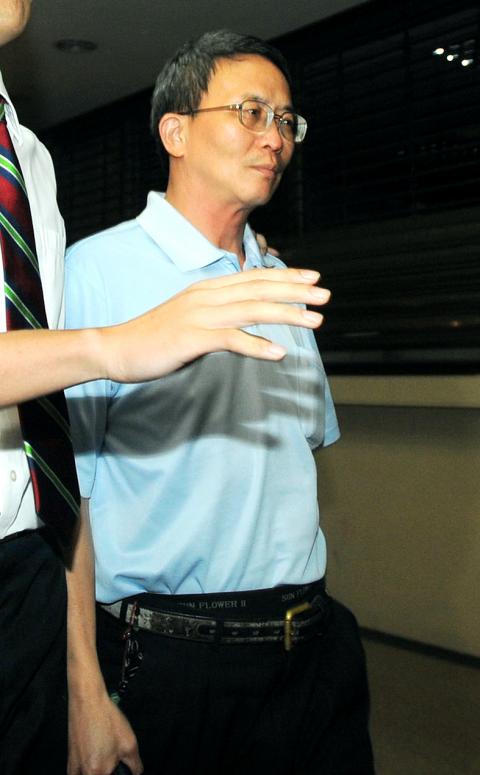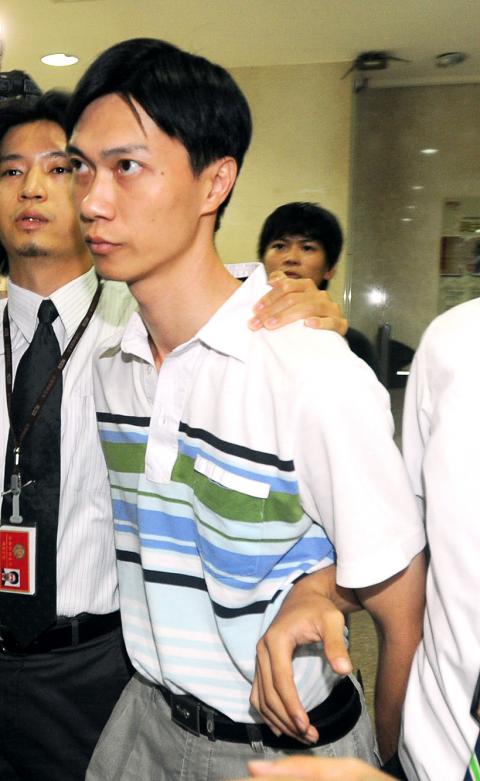The detention of a Central Police University professor yesterday on suspicion of having gathered intelligence for China has sparked much debate, with sources saying that since the signing of a cross-strait agreement on joint efforts to combat crime, China has repeatedly asked Taiwan to establish “anti-terrorism” cooperation targeting pro-Taiwanese independence groups, pro-Xinjiang independence groups, pro-Tibetan independence groups, Falun Gong practitioners and social activists.
Taiwan has so far declined to agree to cooperate because the people China lists as “terrorists” are mostly political dissidents, sources said.
Wu Chang-yu (吳彰裕), an associate professor with the Central Police University’s Department of Administrative Management, teaches Chinese political history at the university.

Photo: Taipei Times
The court granted prosecutors’ request to detain him after interrogation.
Taipei prosecutors also applied to detain Lin Po-hung (林柏宏), a police officer with the -National Police Bureau’s (NPB) Foreign Affairs Department, but the district court released Lin without bail. Prosecutors released another NPB officer, Wu Tung-lin (吳東霖), on NT$100,000 bail.
Prosecutors allege Wu Chang-yu collected information on Chinese dissidents, pro-Tibetan independence activists and the Falun Gong movement in Taiwan, and delivered that information to Chinese authorities.

Photo: Taipei Times
Prosecutors said Wu Chang-yu told investigators the information he offered was not confidential, but common information.
Wu Chang-yu also denied he received money from China, but prosecutors said they have evidence Wu Chang-yu had received at least several free flights to Chinese cities from Chinese authorities.
Wu Chang-yu’s colleagues at the university declined to comment after his arrest, but some have privately said that Wu was troublesome.
Wu Chang-yu receives broad media coverage as a fortune-teller, and the school’s Administrative Management Department has asked him to refrain from mentioning that he teaches at the school while appearing in the media, sources said.
As to whether Wu was helping Beijing gather intelligence, an academic that frequently -travels to China said that China’s intelligence gathering on Taiwan was very thorough, with complete records of who has a special background or is connected to political figures and parties in Taiwanese academia.
This has been made easier for China since President Ma Ying-jeou (馬英九) came to power because cross-strait exchanges have become more frequent, the academic said, adding that the information given to Beijing was both more up-to-date and more accurate.
According to sources, a law professor from National Chengchi University (NCCU) had gone to China on an academic -exchange this summer, but had been questioned by the Ministry of State Security (MSS) without cause and forcibly detained for two to three days.
Academics who are aware of such proceedings said it was not the first time that had happened, and there have been incidents of Taiwanese academics being harassed by the MSS before.
However, the academic added that it was harder to understand why it was still happening, because since Ma came into power, he has claimed that cross-strait relations have improved greatly.
Additional reporting by AFP
Translated by Jake Chung, Staff Writer

MORE VISITORS: The Tourism Administration said that it is seeing positive prospects in its efforts to expand the tourism market in North America and Europe Taiwan has been ranked as the cheapest place in the world to travel to this year, based on a list recommended by NerdWallet. The San Francisco-based personal finance company said that Taiwan topped the list of 16 nations it chose for budget travelers because US tourists do not need visas and travelers can easily have a good meal for less than US$10. A bus ride in Taipei costs just under US$0.50, while subway rides start at US$0.60, the firm said, adding that public transportation in Taiwan is easy to navigate. The firm also called Taiwan a “food lover’s paradise,” citing inexpensive breakfast stalls

TRADE: A mandatory declaration of origin for manufactured goods bound for the US is to take effect on May 7 to block China from exploiting Taiwan’s trade channels All products manufactured in Taiwan and exported to the US must include a signed declaration of origin starting on May 7, the Bureau of Foreign Trade announced yesterday. US President Donald Trump on April 2 imposed a 32 percent tariff on imports from Taiwan, but one week later announced a 90-day pause on its implementation. However, a universal 10 percent tariff was immediately applied to most imports from around the world. On April 12, the Trump administration further exempted computers, smartphones and semiconductors from the new tariffs. In response, President William Lai’s (賴清德) administration has introduced a series of countermeasures to support affected

CROSS-STRAIT: The vast majority of Taiwanese support maintaining the ‘status quo,’ while concern is rising about Beijing’s influence operations More than eight out of 10 Taiwanese reject Beijing’s “one country, two systems” framework for cross-strait relations, according to a survey released by the Mainland Affairs Council (MAC) on Thursday. The MAC’s latest quarterly survey found that 84.4 percent of respondents opposed Beijing’s “one country, two systems” formula for handling cross-strait relations — a figure consistent with past polling. Over the past three years, opposition to the framework has remained high, ranging from a low of 83.6 percent in April 2023 to a peak of 89.6 percent in April last year. In the most recent poll, 82.5 percent also rejected China’s

PLUGGING HOLES: The amendments would bring the legislation in line with systems found in other countries such as Japan and the US, Legislator Chen Kuan-ting said Democratic Progressive Party (DPP) Legislator Chen Kuan-ting (陳冠廷) has proposed amending national security legislation amid a spate of espionage cases. Potential gaps in security vetting procedures for personnel with access to sensitive information prompted him to propose the amendments, which would introduce changes to Article 14 of the Classified National Security Information Protection Act (國家機密保護法), Chen said yesterday. The proposal, which aims to enhance interagency vetting procedures and reduce the risk of classified information leaks, would establish a comprehensive security clearance system in Taiwan, he said. The amendment would require character and loyalty checks for civil servants and intelligence personnel prior to